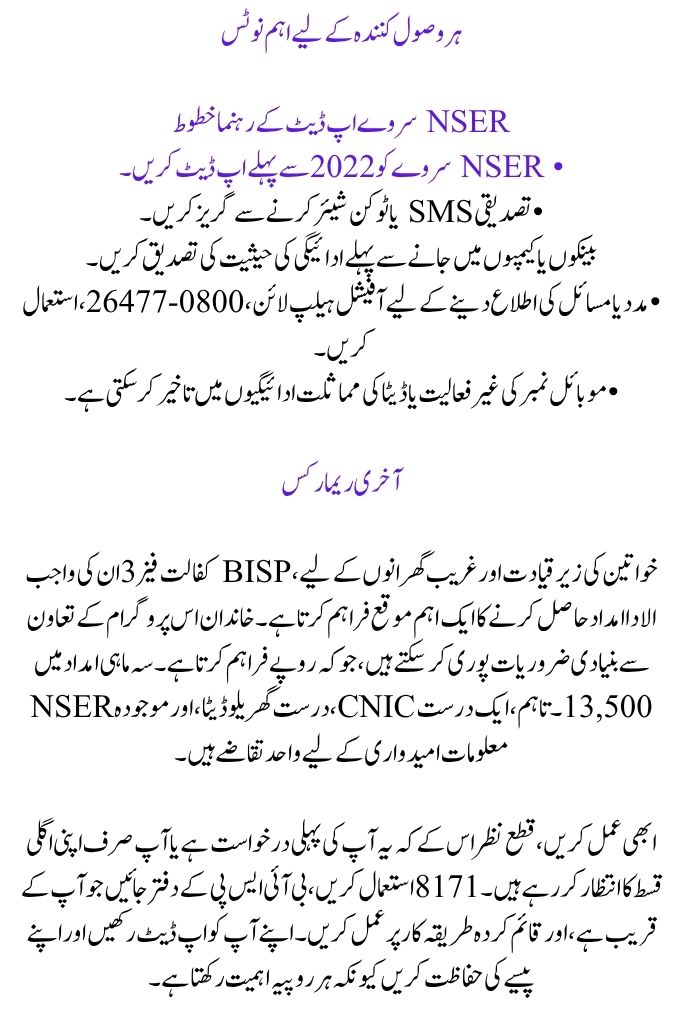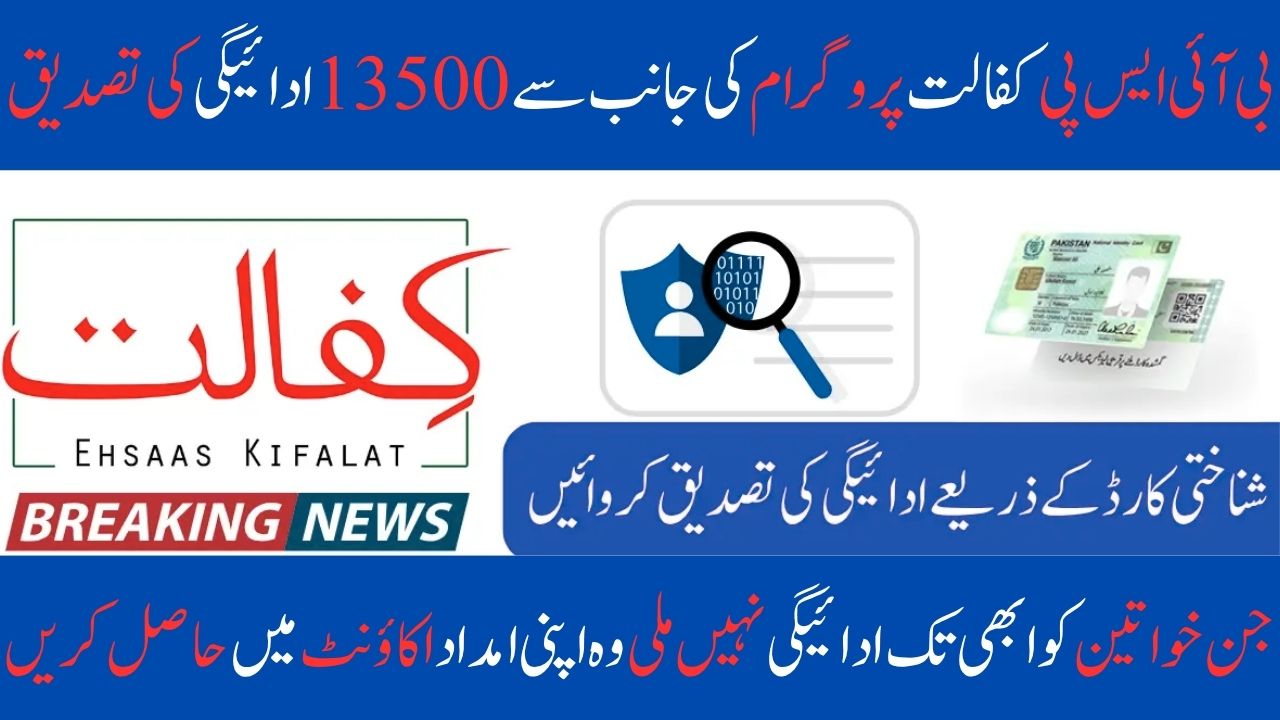Payment for BISP Kafaalat Phase 3
Once more, the BISP Kafaalat Phase 3 Payment has come forward to assist Pakistan’s most needy households. The Rs. 13,500 quarterly payment is anticipated to benefit thousands of additional households with the formal start of Kafaalat Phase 3 on May 26, 2025.
You can read more: The Excellent Update for the BISP 8171 Payment Re-Verification Procedure 2025
For people whose data was out of date or who were excluded in previous rounds, this stage is particularly crucial. Check your CNIC now, make any necessary survey updates, and make sure you don’t fall behind in this important financial aid program.
Women who are widowed, divorced, handicapped, or who handle home duties alone are given extra consideration during this time. By adding new districts, the government has increased coverage, giving more families the opportunity to sign up and get assistance.
However, your household data must represent your current living conditions, and your CNIC must be validated before you may become a beneficiary. A major factor in establishing eligibility is the National Socio-Economic Registry (NSER) score that is associated with your CNIC.
Who is the target audience for BISP Kafaalat Phase 3?
The Kafaalat Program’s third phase is an extension of BISP’s work to provide low-income families with financial stability, particularly women who have struggled because of inflation, job losses, or a lack of resources. By adding previously undiscovered locations and simplifying the process of confirming eligibility using CNIC-based checks, the authorities have enhanced the procedure this time.
This is your chance to sign up and get verified if you have never gotten BISP help once. Additionally, it is essential to be sure your information is current if you are currently a beneficiary in order to prevent disqualification or payment delays.
Key Information for Phase 3 Rollout at a Glance
Date of Launch: May 26, 2025
Amount of Payment: Rs. 13,500
Eligibility requirements are determined by current household data, CNIC verification, and a poverty score of less than 32.
Target Audiences:
Widows
Women who are divorced or abandoned
Women with disabilities
Households headed by women
Families with male members without jobs
New districts in Punjab, Sindh, KP, Balochistan, AJK, and GB are among the covered areas.
For Phase 3, why is CNIC verification important?
You can access BISP advantages using your CNIC. Your CNIC and associated NSER data are used to perform each registration, payment confirmation, and eligibility verification. Even if you qualify, you could not be allowed to participate in this phase if there are any errors in your household’s economic profile, such as your income, assets, or family size.
Simply because their survey was completed before 2022 or because they moved and neglected to update it, many worthy women do not receive their compensation. Verification of your CNIC helps guarantee that your family is classified appropriately and that your poverty score is accurate.
Since their inclusion depends only on updated data, residents of recently included districts should pay particular attention to checking their CNIC right away. You could be eligible this time if your home situation has changed or if your location is now covered, even if you applied in previous phases and were denied.
How to Use CNIC to Verify BISP Eligibility
Kafaalat Phase 3 Payment Qualification Process
• Online CNIC Check: Visit the BISP portal at 8171.bisp.gov.pk to view eligibility status.
• SMS CNIC Check: Type the 13-digit CNIC and send it to 8171 for a status update.
• Both methods are free, and valid CNIC holders can use them.
• Mobile number active for payment confirmation or further instructions via SMS.
| Category | Details |
|---|---|
| Program Name | BISP Kafaalat Phase 3 |
| Launch Date | May 26, 2025 |
| Quarterly Payment Amount | Rs. 13,500 |
| Eligibility Criteria | CNIC verification, NSER poverty score < 32, updated household information |
| Target Beneficiaries | Widows, divorced/abandoned women, disabled women, female-headed households, jobless male-led families |
| New Coverage Areas | Additional districts in Punjab, Sindh, KP, Balochistan, AJK, and GB |
| How to Check Eligibility | SMS CNIC to 8171 or visit 8171.bisp.gov.pk |
| How to Update Info | Visit BISP Tehsil Office with CNIC, B-Form, utility bill, and previous token |
| Payment Collection Methods | Biometric ATMs (HBL, Bank Alfalah), bank counters, JazzCash/EasyPaisa agents, BISP camps |
| Important Tip | Never pay any agent—BISP services are completely free |
| Support Programs | Taleemi Wazaif (education), Nashonuma (nutrition for mothers & infants) |
| Helpline | 0800-26477 |
Update on NSER How to Sign Up or Update Your Information for 13500
Eligibility Check and NSER Update
• If the CNIC check shows ineligibility, visit the BISP Tehsil Office for an NSER survey update.
• Bring the original CNIC, B-Forms of children, recent utility bill, and previous BISP message/token.
• BISP staff will verify identity, update income and family data, and resubmit the application.
• Confirmation about eligibility and payment schedule will be provided post-verification.
How the BISP 13500 Payment Is Collected
Kafaalat Payment Collection Methods
• Bank ATMs (Biometric-enabled)
• HBL and Bank Alfalah ATMs
• Bank Counters
• Mobile Wallets
• JazzCash or EasyPaisa agents
• BISP Official Camps
• Present CNIC and token for collection
• Never pay an agent; all BISP services are free.
You can read more: Payment Update for BISP 8171 2025: Methods for Verification
Other BISP Programs to Be Aware of
Kafaalat Program Support Initiatives
• Taleemi Wazaif: Conditional cash transfers for school-going children.
• Nashonuma Program: Nutritional support for pregnant and breastfeeding mothers and infants.
• These benefits enhance household stability and long-term well-being.
Important Notes for Every Recipient
NSER Survey Update Guidelines
• Update the NSER survey before 2022.
• Avoid sharing confirmation SMS or tokens.
• Confirm payment status before visiting banks or camps.
• Use the official helpline, 0800-26477, for assistance or reporting issues.
• Mobile number inactivity or data mismatch can delay payments.
Last Remarks
For women-led and impoverished households, BISP Kafaalat Phase 3 offers a significant chance to receive the assistance they are due. Families may satisfy basic requirements with the support of this program, which provides Rs. 13,500 in quarterly assistance. However, a valid CNIC, correct household data, and current NSER information are the only requirements for candidacy.
Act now, regardless of whether this is your first application or you’re just waiting for your next installment. Use 8171, go to the BISP office that is closest to you, and adhere to the established procedures. Keep yourself updated and safeguard your money since every rupee matters.

You can read more: June 2025: New 13500 Payment Schedule for the Benazir Kafalat Program
FAQs
1. Who who has previously been denied is eligible to apply for BISP Kafaalat Phase 3?
Applications are now being accepted from anyone whose CNIC or NSER information was previously out of date. Particularly encouraged to reapply are households with altered economic circumstances or residents of recently added areas. At the Tehsil Office, be careful to update your survey.
2. What paperwork is needed to update my NSER profile?
A recent electricity bill, your children’s B-Forms, your original CNIC, and any prior BISP messages or tokens are required. To guarantee a precise reassessment of your eligibility, these are checked by the BISP Tehsil Office.
3. How can I get my Rs. 13,500 Kafaalat payment safely?
Visit specified bank counters, make a withdrawal using JazzCash/EasyPaisa agents, or use biometric-enabled ATMs (HBL or Bank Alfalah). Always carry your proper token and CNIC. Agents who demand money should be avoided; report them by calling the hotline.
